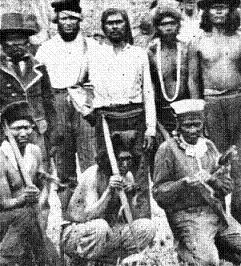Yuki people
 Yuki men at the Nome Cult Farm, ca. 1858 | |
| Regions with significant populations | |
|---|---|
| Languages | |
| English, formerly Yuki language | |
| Related ethnic groups | |
| Wappo people |
The Yuki (also known as Yukiah) are an indigenous people of California, whose traditional territory is around Round Valley, Mendocino County. Today they are enrolled members of the Round Valley Indian Tribes of the Round Valley Reservation.
Yuki tribes are thought to have settled as far south as Hood Mountain in present-day Sonoma County.
History
As European-American settlers began to flock to Northern California in the early 1850s, they drove the Yuki from their lands. The Indians suffered deaths in raids by the local ranchers and the authorities, and captives were taken into slavery.
In 1856, the US government established the Indian reservation of Nome Cult Farm (later to become Round Valley Indian Reservation) at Round Valley. It forced thousands of Yuki and other local tribes on to these lands, often without sufficient support for the transition. These events and tensions led to the Mendocino War (1859), where US forces killed hundreds of Yuki and took others by force to Nome Cult Farm.[citation needed]
Language

The Yuki language is no longer spoken. It is related to the Wappo language,[2] The Yuki people had a quaternary (4-based) counting system, based on counting the spaces between the fingers, rather than the fingers themselves.[3]
Population
Scholarly estimates have varied substantially for the pre-contact populations of most native groups in California, as historians and anthropologists have tried to evaluate early documentation. Alfred L. Kroeber estimated the 1770 population of the Yuki proper, Huchnom, and Coast Yuki as 2,000, 500, and 500, respectively, or 3,000 in all.[4] Sherburne F. Cook initially raised this total slightly to 3,500.[5] Subsequently, he proposed a higher estimate of 9,730 Yuki.[6]
In the 2010 census, 569 people claimed Yuki ancestry. 255 of them were full-blooded.
See also
Notes
- ^ "2010 Census CPH-T-6. American Indian and Alaska Native Tribes in the United States and Puerto Rico: 2010" (PDF). www.census.gov. Retrieved 2015.
{{cite web}}: Check date values in:|accessdate=(help) - ^ "Yuki." Ethnologue. Retrieved 23 October 2012.
- ^ Harrison, p.173
- ^ Kroeber, p.883
- ^ Cook, 1976 p.172
- ^ Cook, 1956 pp.106, 108
References
- Cook, Sherburne F. 1956. "The Aboriginal Population of the North Coast of California", Anthropological Records, 16:81-130. University of California, Berkeley.
- Cook, Sherburne F. 1976. The Conflict between the California Indian and White Civilization. University of California Press, Berkeley.
- Harrison, K. David 2007. When Languages Die. New York: Oxford University Press.
- Kroeber, A. L. 1925. Handbook of the Indians of California. Bureau of American Ethnology Bulletin No. 78. Washington, D.C.
External links
- Four Directions Institute
- Round Valley history
- "Central California culture", Four Directions Institute
